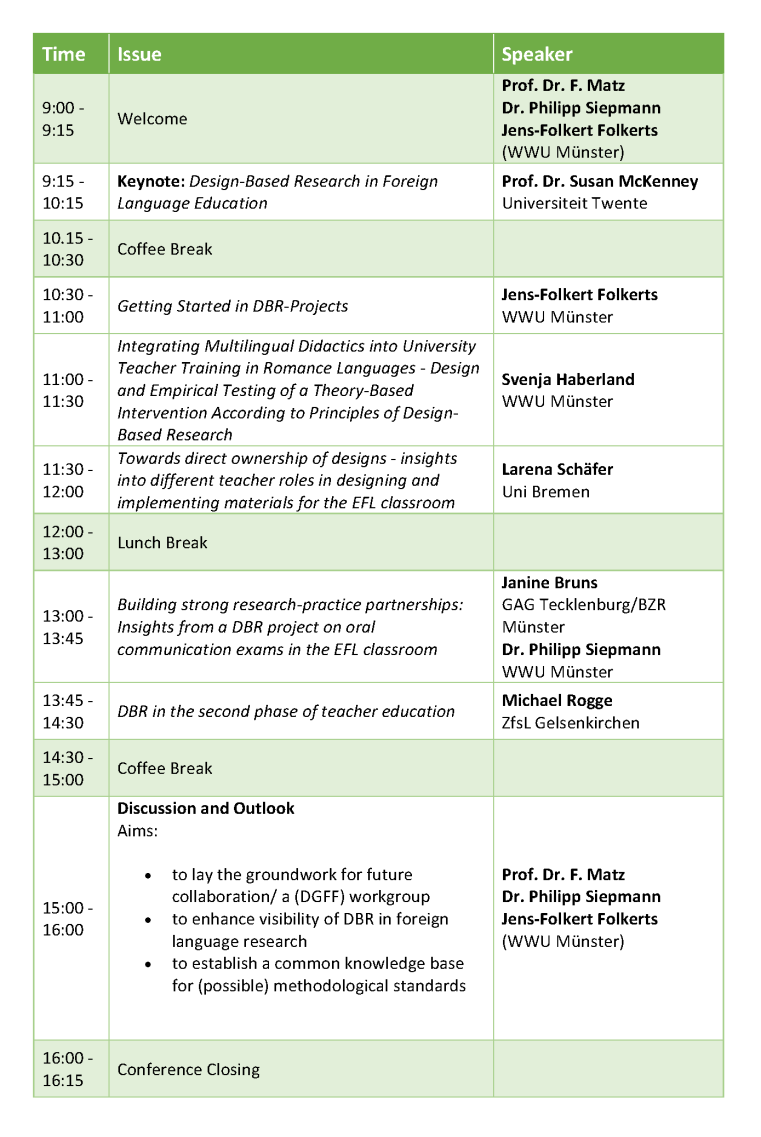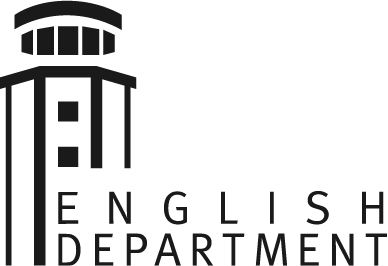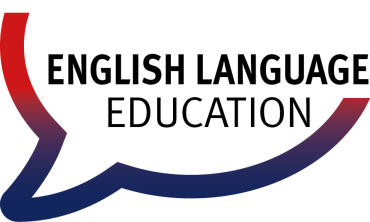

Symposium
-
Design-Based Research in Foreign Language Education
Date: June 10th, 2022
Location: ES202/203, Johannisstr. 12-20, 48143 Münster
Organisers: Chair of English Language Education
Registration: https://wwuindico.uni-muenster.de/e/DBR_in_FLE (deadline 03.06.2022)
Participation Fee: 20€
Conference Language: English
Contact:
Frauke Matz
Philipp Siepmann
Jens-Folkert Folkerts
We kindly thank our supporters:
- FB09
- International Office
- English Department
About
Design-Based Research (DBR) has already become a fixed branch of research in many areas in recent years. In the context of foreign language education, there are already individual projects based on DBR principles, but there is a lack of a systematic methodological discourse. The symposium organized by the Chair of English Language Education aims to provide an impetus for a DBR network in foreign language research. Through the involvement of a pioneer and proven expert in the field of design-based research (Prof. Dr. Susan McKenney), as well as the various perspectives of stakeholders from practice (Michael Rogge, Janine Bruns) and research (Larena Schäfer, Svenja Haberland, Dr. Philipp Siepmann and Jens-Folkert Folkerts), discussions are initiated that systematically reflect the opportunities and challenges of design-based research in foreign language education. In this way, institutional framework conditions for DBR projects will be determined as well as the foundations for embedding DBR in different phases of teacher education. The main goal of this symposium is to establish a work group that further assesses research standards and a thorough knowledge basis that needed to conduct DBR in foreign language education. Therefore, the workgroup is supposed to coordinate and delineate forms of providing access to the gained results. On the one hand, findings should be presented at (international) conferences and on the other hand a publication which outlines DBR methodology in foreign language education should be prepared.
Aims of the symposium:
- To encourage transfer of knowledge between research and practice to outline conditions for successful DBR projects.
- To discuss the challenges and opportunities of design-based research in foreign language education
- To determine institutional framework conditions for a systematic implemenatation in foreign language educational research and foreign language teacher education
Programme

© ELE
Abstracts
Keynote Speaker and Guiding Expert: Prof. Dr. Susan McKenney
Design-Based Research in Foreign Language Education
Educational design research is a genre of study in which the iterative development of solutions to practical and complex educational problems provides the setting for scientific inquiry. The solutions can be educational products, processes, programs or policies. Educational design research not only targets solving significant problems facing educational practitioners, but at the same time it seeks to discover new knowledge that can inform the work of others facing similar problems. Working systematically and simultaneously toward these dual goals is perhaps the most defining feature of educational design research. The process typically ensues in multiple iterations of analysis and exploration; design and construction; and evaluation and reflection. When structured well, insights from each phase are valuable in their own right, and also contribute to the overall goals of the study. This presentation seeks to clarify the nature of educational design research by considering its origins, elaborating its characteristics, and sharing a detailed example related to foreign language education.
Susan McKenney is professor of teacher professionalisation, school development and educational technology at ELAN, the Department of Teacher Professional Development within the Faculty of Behavioural and Management Sciences at Twente University. She is also the programme director of Twente’s Educational Science and Technology master’s programme, and of Pro-U, the in-service education programme for teachers. Her research
focuses on understanding and facilitating the interplay between curriculum development and teacher professional development, and often emphasises the supportive role of technology in these processes. As such, she also studies synergetic research-practice interactions. Since educational design research lends itself to such synergies, her writing and teaching often provide ideas about how to conduct this exciting form of inquiry. Her book, Conducting Educational Design Research (co-authored with Tom Reeves), is now in its 2nd edition.
Jens-Folkert Folkerts
Getting Started in DBR
For a very good reason, McKenney and Reeves (2019) highlight the relevance and importance of the phase of analysis and exploration in their generic model for educational design research. This initial phase of a design-based research project poses several challenges for the researcher. For example, being aware of one’s roles during research is a prerequisite for good scientific practice (Caspari 2016, 368). When choosing a design-based research approach, the different roles of the researcher and practitioners involved (as described in McKenney and Brand-Gruwel 2018) are often set in an area of conflict. On the one hand, there is a long and persistent tradition that tells a story of the practitioner who is the only one who knows “how it’s done”, being immune to new findings. On the other hand, almost everybody is familiar with the tale of the researcher living in an ivory tower unaware of the real world that surrounds him/her. As DBR aims at bridging this gap between theory and practice (Bakker 2019), the researcher is thrown into the middle of this (exaggerated) long lasting irrational battle. Being aware of this is especially relevant in the initial stages of the research process that lay the foundation for a functional cooperation with practitioners. Reflecting on challenges, risks, and opportunities of experiences during the phase of analysis and exploration, this contribution seeks to discuss and shed light on questions that are relevant for all those who think about starting a DBR-project or who seek new alliances with practitioners.
Works cited
Bakker A. (2019): Design Research in Education. A Practical Guide for Early Career Researchers. Routledge, New York and London.
Caspari D. (2016): Wechselspiele zwischen Theorie und Praxis. In: Caspari D., Klippel F., Legutke M., Schramm K. (eds): Forschungsmethoden in der Fremdsprachendidaktik. Ein Handbuch. Narr, Tübingen, 365-369.
McKenney S, Reeves T. C. (2019): Conducting Educational Design Research. Second Edition. Routledge, London and New York.
McKenney S., Brand-Gruwel S. (2018): Roles and Competencies of Educational Design Researchers: One Framework and Seven Guidelines. In: Spector M., Lockee B., Childress M. (eds) Learning, Design, and Technology. Springer, Cham.
Svenja Haberland
Integrating Multilingual Didactics into University Teacher Training in Romance Languages - Design and Empirical Testing of a Theory-Based Intervention According to Principles of Design-Based Research
According to current educational policy guidelines, students’ multilingualism has to be recognized and promoted by teachers when instructing a foreign language at school (e.g. Ministerium 2019: 14). Despite the positive effects of cross-linguistic approaches that have led to a paradigm shift within foreign language didactics, empirical studies repeatedly point to a dichotomy between positive teacher attitudes concerning multilingualism and a lack of implementation of multilingual didactics in real teaching practice (e.g. Bredthauer/Engfer 2018: 9-10; Heyder/Schädlich 2014: 193-196). In fact, it can be observed that teachers who are willing to integrate students’ linguistic resources into foreign language instruction usually fail to achieve positive effects because they conduct unsystematic language comparisons at the lexical or grammatical level, which, in addition, do not include any family languages at all (e.g. Bermejo Muñoz 2019: 110-111; Bredthauer/Engfer 2018: 10-12; Heyder/Schädlich 2014: 193-196). This situation indicates the need for a more grounded, systematic and reflective teacher education that focuses on the didactics of multilingualism (e.g. Bredthauer/Engfer 2018: 16-17; Königs 2006: 216-219; Meißner 2001: 114). The outlined desideratum forms the groundwork for an ongoing doctoral project that aims to integrate multilingual didactics into existing academic curricula of prospective teachers of Romance languages. In detail, the project intends to improve university students’ knowledge, skills as well as their individual perceptions of their own competences when it comes to the implementation of a multilingual didactic approaches in future teaching scenarios. For that purpose, an intervention consisting of multilingual modules has been developed, tested and re-designed several times, taking into account the principles of design-based research. Accordingly, the presentation will provide concrete insights into the teaching modules, the methodological procedure and the first meaningful results of the empirical test cycles which have been conducted at the University of Münster.
Bibliography
Bermejo Muñoz, Sandra (2019): Berücksichtigung schulischer und lebensweltlicher Mehrsprachigkeit im Spanischunterricht. Eine empirische Studie. Trier: WVT.
Bredthauer, Stefanie/Engfer, Hilke (2018): Natürlich ist Mehrsprachigkeit toll! Aber was hat das mit meinem Unterricht zu tun? Kölner Universitäts Publikations Server ‹https://kups.ub.uni-koeln.de/8092› (17.05.2022).
Heyder, Karoline/Schädlich, Birgit (2014): Mehrsprachigkeit und Mehrkulturalität – eine Umfrage unter Fremdsprachenlehrkräften in Niedersachsen. Zeitschrift für Interkulturellen Fremdsprachenunterricht – Didaktik und Methodik im Bereich Deutsch als Fremdsprache 19 (1), 183-201.
Königs, Frank G. (2006): Mehrsprachigkeit und Lehrerbildung: Zum Spannungsfeld zwischen inhaltlicher Notwendigkeit und struktureller Machbarkeit, in: Martinez, Hélène/Reinfried, Marcus (edd.): Mehrsprachigkeitsdidaktik gestern, heute und morgen – Festschrift für Franz-Joseph Meißner zum 60. Geburtstag. Tübingen: Narr, 215-225.
Meißner, Franz-Joseph (2001): Mehrsprachigkeitsdidaktik im Studium von Lehrenden fremder Sprachen, in: Königs, Frank G. (ed.): Impulse aus der Sprachlehrforschung. Marburger Vorträge zur Ausbildung von Fremdsprachenlehrerinnen und -lehrern, Tübingen: Narr, 111-130.
Ministerium = Ministerium für Schule und Bildung des Landes Nordrhein-Westfalen (2019): Kernlehrplan für die Sekundarstufe I Gymnasium/Gesamtschule in Nordrhein-Westfalen. Spanisch.‹https://www.schulentwicklung.nrw.de/lehrplaene/lehrplan/138/gym8_spanisch.pdf› (17.05.2022).
Larena Schäfer
Towards Direct Ownership of Designs - Insights into Different Teacher Roles in Designing and Implementing Materials for the EFL Classroom
Based on the assumption that “project partner-participants” (Wang & Hannafin 2005) play a crucial role in DBR-projects, the talk explores how the role of teachers in the design development process can be successfully shaped. The talk will focus on two “meso-cycles” (McKenney & Reeves 2012) of my completed PhD study, in which I cooperated intensively with two teachers in the construction, implementation and evaluation of materials for the inclusive EFL classroom. It can be shown that one teacher developed a stronger sense of design ownership when she took a “co-designer” (Cviko et al. 2014) position in the design process rather than simply implementing a lesson sequence prepared by the researcher. Further, a collaborative developer role contributed to a more positive assessment of the significance of a design by the teacher, which seems particularly important regarding supposedly unusual, innovative subject matters, such as Street Art in the English classroom. These findings will culminate in the formulation of conducive methodological conditions regarding the role of teachers in DBR-projects in Foreign Language Education.
Works cited:
Cviko, Amina; McKenney, Susan & Voogt, Joke: Teacher roles in designing technology-rich learning activities for early literacy: A cross-case analysis. Computers & Education 72, 68-79.
McKenney, Susan & Reeves, Thomas C. Design (2012) Conducting Educational Design Research. London: Routledge.
Wang, Feng & Hannafin, Michael J. (2005): Desing-Based Research and Technology-Enhanced Learning Environments. Educational technology research and development 53: 4, 5-24.
Janine Bruns & Philipp Siepmann
Building Strong Research-Practice Partnerships: Insights from a DBR Project on Oral Communication Exams in the EFL Classroom
This talk will highlight the significance of close cooperation between researchers and practitioners in design-based research projects. Reporting on preliminary results from a project on oral communication exams in the EFL (English as a Foreign Language) classroom, theoretical and practical perspectives are combined. Thus, it will be demonstrated that complex pedagogical and didactical challenges such as the fair, valid and economic assessment of oral exams require both a thorough empirical and theoretical analysis, as well as practical intervention and reflection. Joining forces, Janine Bruns (teacher for English, Spanish and French at Graf Adolf Gymnasium in Tecklenburg, NRW and the superintendent’s consultant at the Münster District Government) and Dr. Philipp Siepmann (teacher for English and Geography, researcher and lecturer at the Chair of TEFL, WWU Münster) have developed a new design for oral communication exams in a series of practical interventions, which have also yielded important theoretical insights into this still rather new format of summative assessment. The presentation will close with a reflection on the benefits and challenges from both the practitioner’s and the researcher’s perspective and an outlook on how the cooperation will continue.
Michael Rogge
DBR in the Second Phase of Teacher Education
The new teacher training curriculum in North-Rhine Westphalia (Kerncurriculum 2021) defines teacher education as a professionalisation process that encompasses the entire professional life and tries to bridge the gap between theoretical and practical aspects of teacher education at university and during the induction period at the ZfsL. The workshop presents some of the typical challenges of teacher education in the second phase and discusses whether an agile methodology and a design-based approach might help to bridge the gap between theory and practice and promote a more self-directed and project oriented learning in teacher education.


